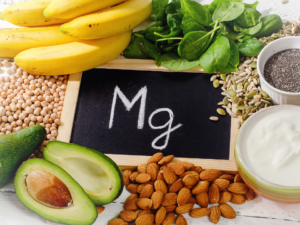Magnesium’s Hidden Benefits for Stress, Energy, Sleep, and Wellness
Chronic Stress Depletes Magnesium
In today’s fast-paced world, stress has become a common part of life. It can affect both our physical and mental health.
One of the lesser-known effects of chronic stress is the loss of magnesium.
This is a vital mineral that plays a big role in helping our bodies manage stress effectively.
Keeping your magnesium levels in check is essential for managing stress and maintaining overall well-being.
The Hidden Stressors of Modern Life
We are all aware of common stressors like finanacial issues, relationship issues, and work or school pressures. However, modern life also brings less obvious stressors like exposure to environmental toxins, diets high in processed foods, and constant Wi-Fi and screen exposure.
These hidden factors can strain our bodies, adding to the stress we already face..
Could You Be Low in Magnesium?
Let’s have a look at some telltale signs:
If you’re experiencing fatigue, muscle cramps, headaches, or difficulty sleeping, you might be low in magnesium. Other symptoms of magnesium deficiency include:
- Pre-menstrual syndrome (PMS)
- Mood disorders such as anxiety and depression
- Increased stress levels
If you think you may be low in magnesium, consult with a naturopath at Your Wellness Centre to assess your needs and check if magnesium supplementation could help you.
Causes of Magnesium Deficiency
Several factors can lead to magnesium deficiency, including:
- Inadequate dietary intake: Not eating enough magnesium-rich foods.
- Chronic stress: Elevated stress hormones can deplete magnesium stores, leading to a cycle of deficiency and increased stress.
- Excessive caffeine and alcohol consumption: These substances can increase magnesium loss through urination.
- Certain medications: Antibiotics, diuretics, and steroids can reduce magnesium levels.
The Many Benefits of Magnesium
Magnesium is the fourth most abundant mineral in the body and supports numerous health functions. Its benefits include:

- Reducing stress hormone effects:
Promotes calming sleep, relaxes muscles, reduces cramping. - Protecting brain health: Improves memory, concentration, and learning while lowering anxiety.
- Regulating blood sugar: Helps control weight, reduce sugar cravings, and boost energy levels.
Boost Your Energy with Magnesium

Stress affects your body’s energy levels. It causing energy molecules to leak from cells leading to fatigue.
Magnesium is crucial in energy production, helping your body adapt to stress and maintain vitality.
Daily Tips for Stress Management and Optimal Magnesium levels
To protect your body from stress and maintain magnesium levels, consider the following tips:

- Limit caffeine: Reduce to a maximum of one cup per day.
- Eat magnesium-rich foods: Include spinach, dark chocolate, avocado, almonds, pumpkin seeds, and black beans in your diet.
- Minimize sugar and processed foods: Choose nutrient-dense whole foods instead.
- Prioritise sleep: Create a cool, dark, and quiet sleep environment, and unplug from electronic devices 1-2 hours before bedtime.
- Exercise regularly: Physical activity can help counteract the negative effects of stress.
Selecting the Right Magnesium Supplement
If stress is affecting your life, a naturopath at Your Wellness Centre can recommend the right magnesium supplement. One known for its superior absorption and gentle impact on the digestive tract.
Top 7 Reasons You Need Extra Magnesium
- Dietary Deficiency: ABout one-third of Australians don’t meet the recommended daily intake of 310-420 mg of magnesium.
- Depleted Soils: Modern agriculture has reduced soil mineral content, making it harder to get enough magnesium from foods.
- Tannins in Coffee and Tea: These substances reduce magnesium absorption in the intestines.
- Caffeine and Alcohol: These have a diuretic effect, increasing magnesium loss.
- Medication Impact: Antibiotics, diuretics, and steroids can deplete magnesium levels.
- Stress Response: Low magnesium levels can trigger stress, further depleting magnesium stores.
- Poor Sleep and Fatigue: Magnesium supports the production of relaxing neurotransmitters like GABA (gamma-aminobutyric acid) and melatonin.
.
How to Increase Your Magnesium Intake
To boost your magnesium levels, consider adding a supplement to complement your diet. When choosing a magnesium supplement, look for:
- Dose: Look for supplements containing 300 mg of elemental magnesium per dose. Opt for magnesium bisglycinate, which offers better absorption and fewer digestive issues compared to other forms like magnesium oxide and citrate. Talk to a Naturopath at Your Wellness Centre for further explanation and clarification.
Foods high in Magnesium
Herb Kale – Your Wellness Centre Magnesium is found in leafy greens
Fortunately, you can find Magnesium benefits in a wide range of foods.
Best ones include the following fresh, nutrient-rich foods which you can add to your diet each day:
• Green leafy vegetables: spinach, kale and silver beet.
• Nuts and seeds: raw almonds, cashews, brazil nuts, pumpkin seeds and sunflower seeds.
• Whole grains: rye, quinoa, oats, wheat, and buckwheat.
For Full Magnesium Benefits, Replenish Your Reserves of Magnesium
Magnesium Helps many Health Conditions
including:
- Stress and anxiety
- High blood pressure
- Insomnia
- Muscle tension and cramps
- Diabetes
- Headaches and migraines
- Fatigue and chronic fatigue syndrome
- Fibromyalgia

Tailored Magnesium Solutions
If you experience any of the conditions listed above, you could well benefit from taking extra Magnesium. Speak with a naturopath at Your Wellness Centre.
They can recommend a magnesium supplement tailored to your specific needs, whether it’s for stress, cramps, fatigue, or high blood pressure.
By understanding the connection between magnesium and stress, you can take beneficial steps to support your Health and Wellness and improve your resilience to the challenges of modern life.
Magnesium is more than just a mineral—it’s a vital component of your well-being.
Remember you can contact us
or Ring
03 9879 9596



Leave a Reply
Want to join the discussion?Feel free to contribute!